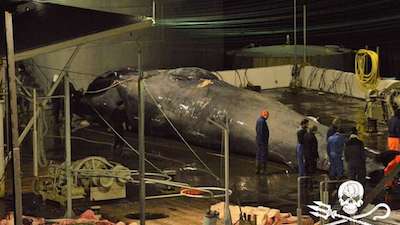In 2020, anti-whaling advocates celebrated a notable decision by both of Iceland’s remaining whaling companies – IP-Utgerd and Hvalur hf – to cease operations. No minke whales were killed around Iceland last year, and the head of Hvalur hf, CEO Kristján Loftsson, says he will never hunt again.
Reasons cited included an extended no-fishing zone, coronavirus social distancing regulations, and declining exports to Japan. Thus, the decision was largely profit-based, and not driven by what we would hope to be ethical concerns about an abhorrent practice like whaling. According to Loftsson, coronavirus social distancing regulations would make their usual processing of whales impossible. Additionally, the extension of no-fishing zones would require travel further offshore to find whales.
Yet, let me give a shout out to the Icelandic government here. With competition between the two countries being at an all-time high, Japan went with new government subsidies for Japanese whale meat. Iceland could have put in place similar policies to keep this dying industry going a little longer, but elected not to do so. They deserve full credit for that. Certainly, Iceland’s policy position on the issue is very consistent with the nation’s PM, Katrín Jakobsdóttir, and her generally pro-environment stance.
Iceland’s move is significant as it was one of only three nations that maintained a commercial hunt. Now, there are only two – Norway and Japan. Note 1 After a large number of species were nearly hunted to extinction, a moratorium on commercial whaling was established in 1986. Having ignored this international agreement, the three nations combined have killed over 30,000 whales since 1986, according to the World Wildlife Fund (WWF).
But here are two reasons to be hopeful that this vile and archaic industry is on the way out. Both reflect profound societal changes that are driving demand – in one case causing it to plummet, and the other pushing it in the opposite direction.
Japan’s move to resume subsidized commercial whaling meant that the prior demand for Icelandic whale meat disappeared. Without an export market, there is too little local demand to keep the hunts economically viable. Even in Japan the consumption of whale meat has fallen dramatically, dropping from 203,000 tons in 1965 to less than 4,000 today. If this trend continues, the industry shouldn’t be around much longer.
In the meantime, one industry that is experiencing significant growth is whale watching. It appears that taking people out to watch whales may be more profitable than hunting them. The number of people taking advantage of these excursions in Iceland has seen a five-fold increase in the last 15 years, and is now bringing in the equivalent of almost $30 million a year. Japan has experienced a similar trend, more than doubling the number of whale watchers there in the last 10 years.
Around the world, a growing awareness of the need for conservation, and an appetite for eco-tourism, should cause any potential new entrants to this industry to think twice. If these trends continue, and with a little luck, we will push whaling out of existence forever.
Note 1 There are two exceptions permitted under the to IWC moratorium agreement. These are whaling for scientific research, and aboriginal subsistence whaling. Japan joined the IWC but continued hunting whales through a farcical scientific research program. This ended in July of 2019 when it left the IWC to hunt whales commercially in Japanese waters, no longer under the guise of scientific research in the Antarctic. As well, subsistence hunts continue to this day in Greenland, Siberia, Alaska and Northern Canada. So it’s fair comment when someone reminds us (and they do) that Canada is itself still a whaling nation.
For The Orca’s Voice,
Phil, Canadian Cetacean Alliance



Leave a Reply